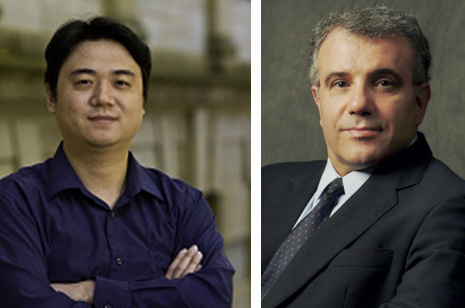FAYETTEVILLE, Ark. – A team of researchers from the University of Arkansas has won the 2010 AT&T Technology & Environment Award. The university is one of three institutions nationwide being recognized, and will receive a $25,000 cash prize from AT&T.
Kazem Sohraby and Jingxian Wu, professors of electrical engineering in the College of Engineering at the University of Arkansas, led the winning research team; their collaborators at AT&T Research Labs were Rittwick Jana and Mahmoud Daneshmand.
Now in its 15th year, the AT&T Technology & Environment Award — formerly known as the Industrial Ecology Fellowship Program — recognizes university and college research focused on how information and communications technology affects the environment. It is intended to stimulate research surrounding environmental issues, engineering, science and other disciplines.
AT&T judged applications from individual faculty members and teams representing higher-learning institutions from around the country. Selections were based on the strength of research showing how businesses can reduce their environmental impact through use of information and communications technology products and services. These products and services could include mobile connectivity; wireless relay networks; and even two-way smart grid communication solutions.
“The AT&T Technology & Environment Award is intended to foster innovation among our most respected academic institutions and most promising researchers,” said Ed Drilling, president of AT&T Arkansas. “The winning research project from the University of Arkansas is just the type of innovation that U.S. businesses need to compete now while helping make our planet a more livable place in the future.”
Sohraby and Wu received the AT&T award for their planned research project to develop baselines for technologies that will allow wireless relay networks to be more energy efficient, environmentally sustainable and economical than current wireless systems.
Keith Cambron, president and chief executive officer of AT&T Labs, was among those presenting the award to Sohraby, Wu and the University of Arkansas at an April 28 event on campus.
University of Arkansas Provost Sharon Gaber welcomed AT&T representatives and university leaders to celebrate this occasion.
“This prestigious award from AT&T showcases two areas of importance to the university: research and the environment,” said Gaber. “I am proud to witness this recognition of two fine faculty members, and I am confident their research will change wireless communication for the better. Congratulations to my colleagues, and thank you to AT&T for acknowledging their hard work.”
State Rep. Jon Woods of Springdale also participated in the event and said, “Two of my primary legislative interests are higher education and the subject of advanced communications and information technology, because they are so vital to our state’s economic and social growth. It’s a pleasure to be reminded, once again, that the University of Arkansas is conducting world-class research, and to know that this AT&T award supports research that may help bring new technology and services for Arkansans.”
Wireless networks can be expensive to construct and operate, especially in areas that are sparsely populated or have difficult terrain. Soharby and Wu noted in their proposal that wireless relay networks use a series of relay nodes to transfer information between a base station and the user’s mobile device or station. That technology can make it possible to provide reliable services, including wireless broadband data, to sparsely populated areas at reasonable cost.
While there is growing interest in wireless relay networks to serve customers in rural areas or challenging terrain, there has been relatively little research devoted to designing those networks from the perspective of environmental or economic efficiency and sustainability. The work to be done by Sohraby and Wu will include development of optimization tools to aid in design of practical wireless relay networks that are environmentally sustainable, economically profitable, and can provide satisfactory communication services to a large population at reasonable cost.
“It is expected that expansion of the current optimization tools at the University of Arkansas through incorporation of economic and environmental impact analysis modules will allow AT&T to start looking at environmentally sensitive models for its wireless business,” Sohraby and Wu wrote in their winning proposal. In addition, they expect that undergraduate and graduate students “will be equipped with new knowledge enabling them to enjoy an interdisciplinary approach to engineering education.”
